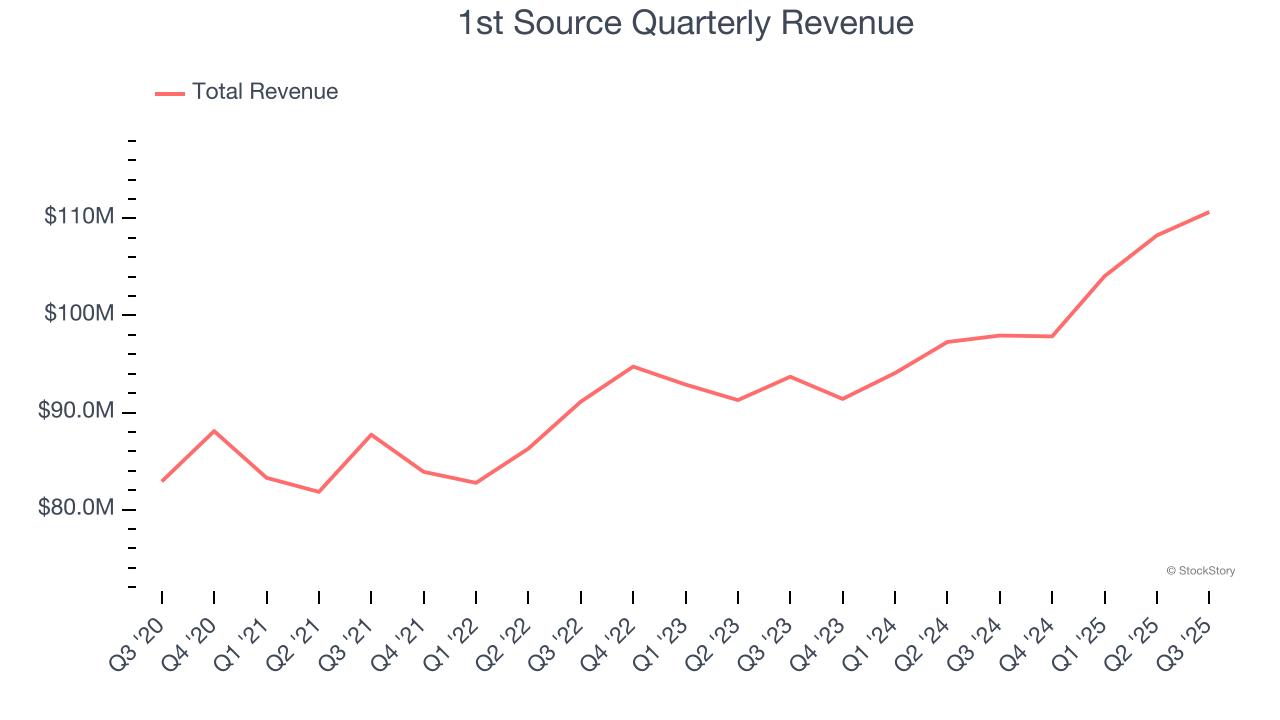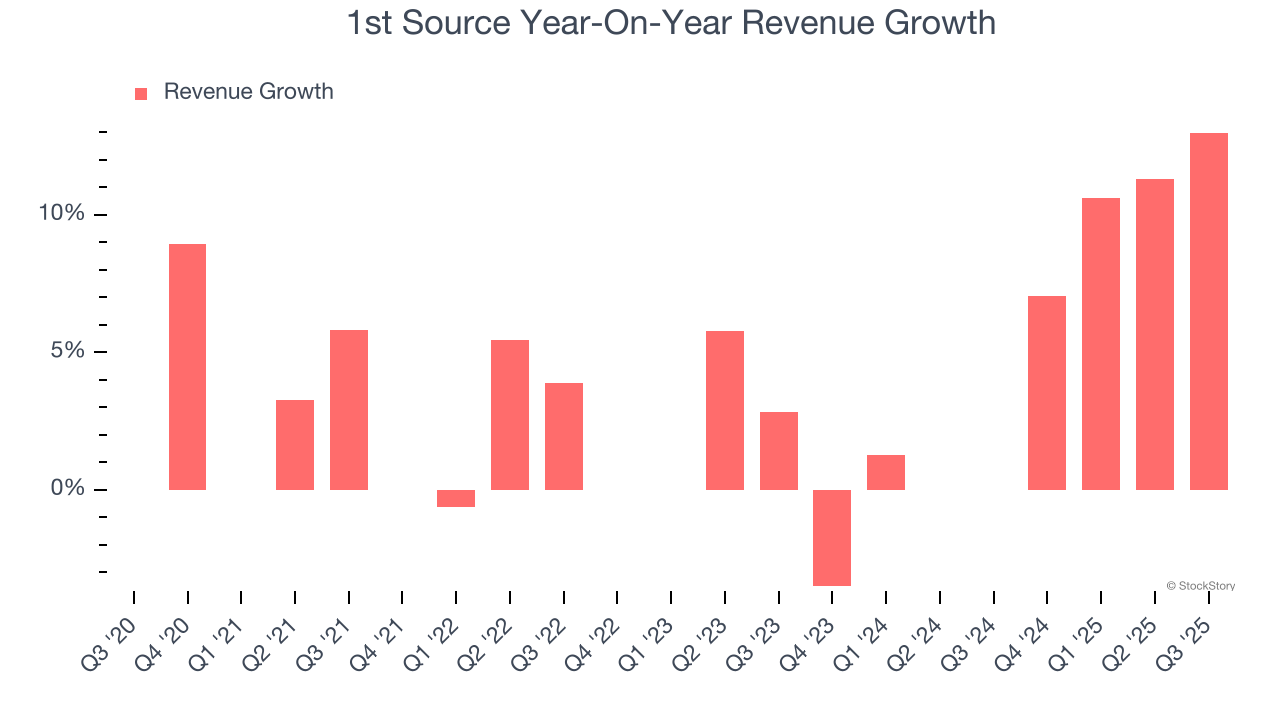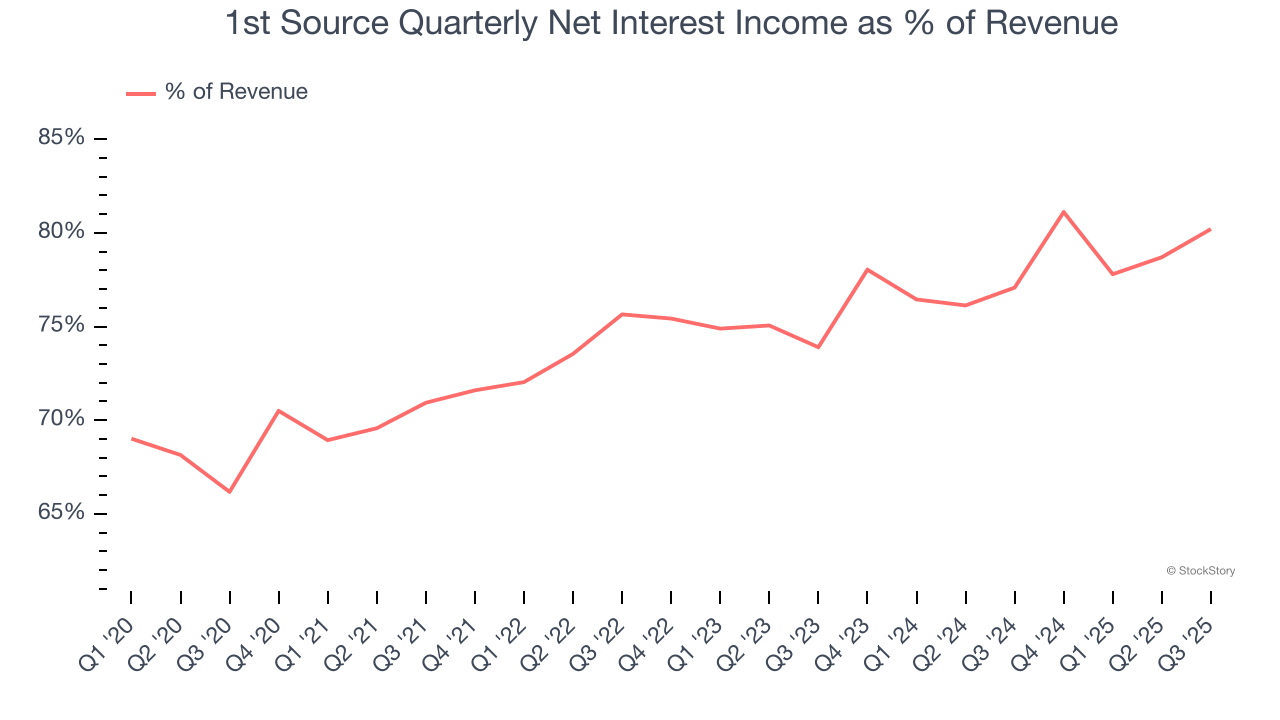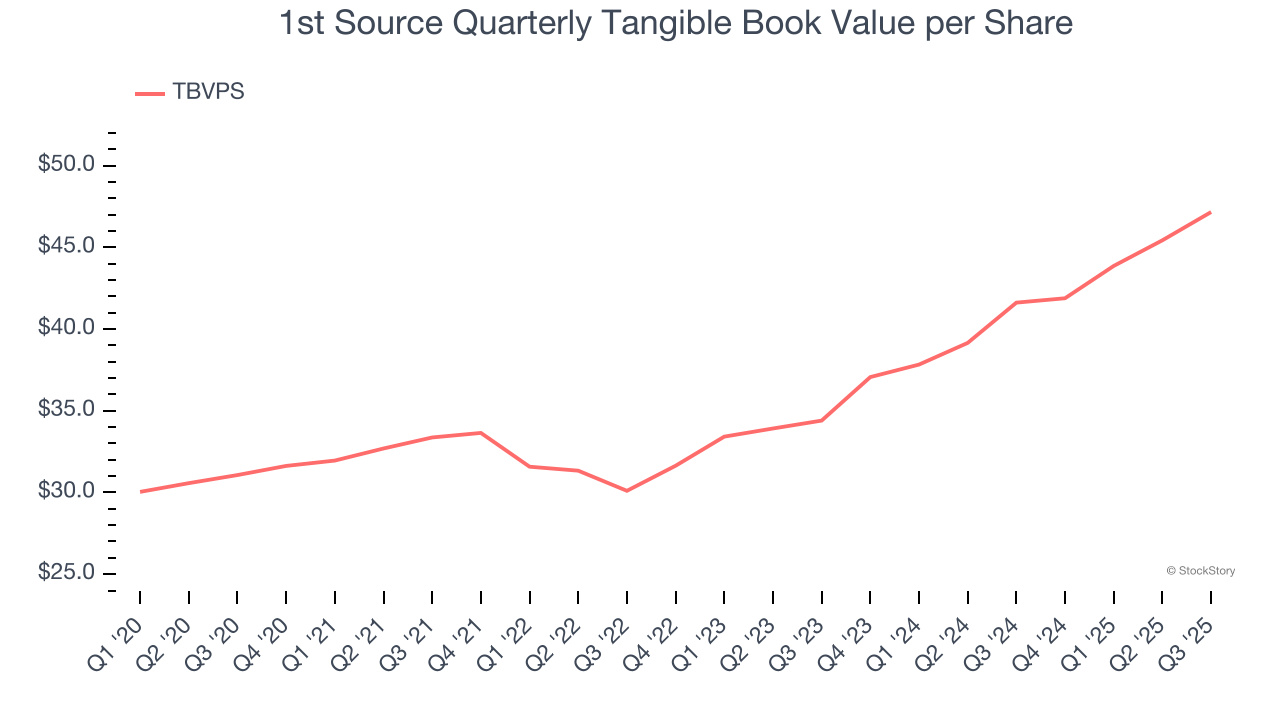
Regional banking company 1st Source (NASDAQ: SRCE) reported revenue ahead of Wall Street’s expectations in Q3 CY2025, with sales up 13% year on year to $110.7 million. Its GAAP profit of $1.71 per share was 7.1% above analysts’ consensus estimates.
Is now the time to buy 1st Source? Find out by accessing our full research report, it’s free for active Edge members.
1st Source (SRCE) Q3 CY2025 Highlights:
- Net Interest Income: $88.75 million vs analyst estimates of $86.13 million (17.6% year-on-year growth, 3% beat)
- Net Interest Margin: 4.1% vs analyst estimates of 4% (10.3 basis point beat)
- Revenue: $110.7 million vs analyst estimates of $109.3 million (13% year-on-year growth, 1.3% beat)
- Efficiency Ratio: 49.5% vs analyst estimates of 48.8% (66.7 basis point miss)
- EPS (GAAP): $1.71 vs analyst estimates of $1.60 (7.1% beat)
- Tangible Book Value per Share: $47.17 vs analyst estimates of $47.42 (13.3% year-on-year growth, 0.5% miss)
- Market Capitalization: $1.48 billion
Andrea G. Short, President and Chief Executive Officer, commented, "We are pleased that we achieved record quarterly net income during the third quarter and continued net interest margin expansion for the seventh consecutive quarter. Higher rates on increased average loan and lease balances, and lower short-term borrowing costs led to an eight basis point improvement in our margin from the prior quarter. The credit quality challenges we experienced during the second quarter improved moderately during the quarter and our nonperforming asset levels decreased. Nonperforming assets to loans and leases at September 30, 2025 was 0.91% down from 1.06% at June 30, 2025 while the allowance for loans and lease losses as a percentage of total loans and leases remained strong at 2.32% up slightly from 2.30% the previous quarter.
Company Overview
Tracing its roots back to 1863 during the Civil War era, 1st Source Corporation (NASDAQ: SRCE) is a regional bank holding company that provides commercial, consumer, specialty finance, and wealth management services across Indiana, Michigan, and Florida.
Sales Growth
From lending activities to service fees, most banks build their revenue model around two income sources. Interest rate spreads between loans and deposits create the first stream, with the second coming from charges on everything from basic bank accounts to complex investment banking transactions. Luckily, 1st Source’s revenue grew at a decent 5.5% compounded annual growth rate over the last five years. Its growth was slightly above the average banking company and shows its offerings resonate with customers.

Long-term growth is the most important, but within financials, a half-decade historical view may miss recent interest rate changes and market returns. 1st Source’s annualized revenue growth of 6.3% over the last two years aligns with its five-year trend, suggesting its demand was stable.  Note: Quarters not shown were determined to be outliers, impacted by outsized investment gains/losses that are not indicative of the recurring fundamentals of the business.
Note: Quarters not shown were determined to be outliers, impacted by outsized investment gains/losses that are not indicative of the recurring fundamentals of the business.
This quarter, 1st Source reported year-on-year revenue growth of 13%, and its $110.7 million of revenue exceeded Wall Street’s estimates by 1.3%.
Net interest income made up 74.9% of the company’s total revenue during the last five years, meaning lending operations are 1st Source’s largest source of revenue.

Markets consistently prioritize net interest income growth over fee-based revenue, recognizing its superior quality and recurring nature compared to the more unpredictable non-interest income streams.
Unless you’ve been living under a rock, it should be obvious by now that generative AI is going to have a huge impact on how large corporations do business. While Nvidia and AMD are trading close to all-time highs, we prefer a lesser-known (but still profitable) stock benefiting from the rise of AI. Click here to access our free report one of our favorites growth stories.
Tangible Book Value Per Share (TBVPS)
The balance sheet drives banking profitability since earnings flow from the spread between borrowing and lending rates. As such, valuations for these companies concentrate on capital strength and sustainable equity accumulation potential.
This explains why tangible book value per share (TBVPS) stands as the premier banking metric. TBVPS strips away questionable intangible assets, revealing concrete per-share net worth that investors can trust. On the other hand, EPS is often distorted by mergers and flexible loan loss accounting. TBVPS provides clearer performance insights.
1st Source’s TBVPS grew at an excellent 8.7% annual clip over the last five years. TBVPS growth has also accelerated recently, growing by 17.1% annually over the last two years from $34.40 to $47.17 per share.

Over the next 12 months, Consensus estimates call for 1st Source’s TBVPS to grow by 10.5% to $52.11, solid growth rate.
Key Takeaways from 1st Source’s Q3 Results
We enjoyed seeing 1st Source beat analysts’ net interest income expectations this quarter. We were also happy its revenue narrowly outperformed Wall Street’s estimates. On the other hand, its tangible book value per share slightly missed. Overall, this print had some key positives. The stock traded up 1.6% to $59.85 immediately after reporting.
1st Source had an encouraging quarter, but one earnings result doesn’t necessarily make the stock a buy. Let’s see if this is a good investment. When making that decision, it’s important to consider its valuation, business qualities, as well as what has happened in the latest quarter. We cover that in our actionable full research report which you can read here, it’s free for active Edge members.






